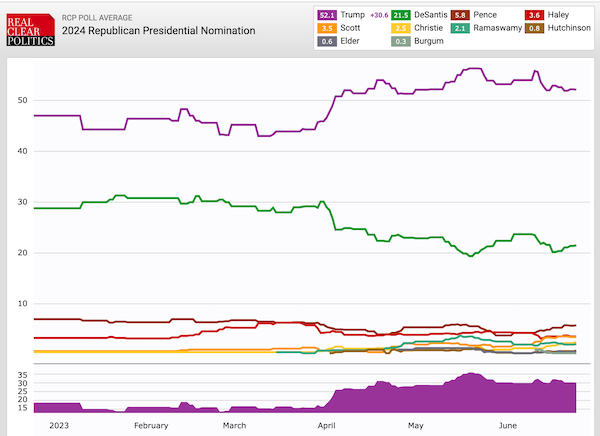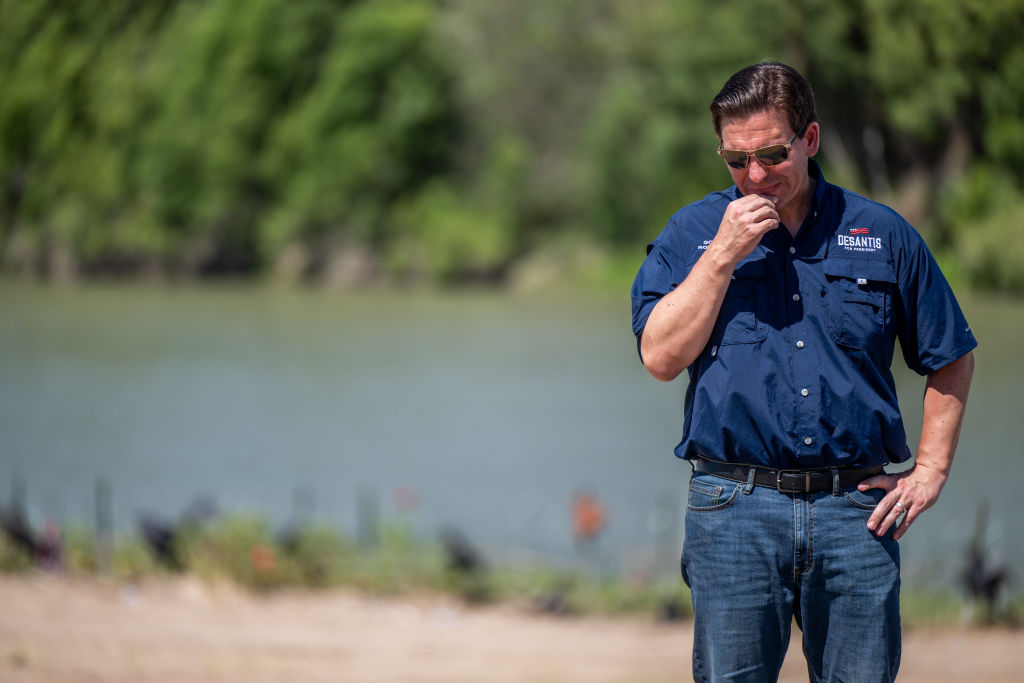Now is the summer of our discontent.
Ron DeSantis declared his presidential candidacy more than a month ago. Donald Trump has been under federal indictment for nearly three weeks. Yet not since early April have the polls shifted in a meaningful way.
And that shift wasn’t in the direction most Dispatch readers were probably hoping.

If you’re counting on the debates to shake things up, bear in mind that the first one won’t be held for another two months. We’ll be on the cusp of fall before Trump’s opponents get a nationally televised introduction to Republican voters. And that introduction might be complicated by … counterprogramming.
Until then, there’s no reason to think anything will happen to disrupt the state of the race. Trump might get indicted again (and again) but we’re already two indictments deep and there’s no evidence that criminal jeopardy is eroding his support. On the contrary, it was almost certainly a backlash on the right to the indictment filed in Manhattan on March 30 that sent his polling soaring in early April.
Two weeks ago I questioned how long the anti-anti-Trumpers who are backing DeSantis will stick with the governor if his polling begins to slip. For traditional conservatives, the argument for preferring him to Tim Scott or Nikki Haley is circumstantial: He’s worth supporting because he’s the candidate with the second-highest level of support, still the best bet to knock Trump off. If and when he falls to third, the bottom will fall out of that logic. Lukewarm DeSantis voters will ditch the governor and scramble to find a more viable Trump alternative before Iowa.
Supposedly. But what if instead they arrive en masse at the conclusion that there is no viable alternative?
A DeSantis polling collapse or even a lengthy stagnation stretching deep into fall could lead anti-Trump Republicans to surmise that stopping Trump is futile and to throw in the towel. I wonder, in fact, if some critical mass of voters dispirited by the current DeSantis stagnation has already quietly decided that this cake is, for all intents and purposes, baked.
Former judge J. Michael Luttig, a conservative of sterling intellect and civic character, argued recently that it’s not too late for the Republican Party to change course. Give me some reason to think that he’s right, that this now-frozen field might thaw sometime before Iowa.
Because it’s getting harder to see how.
I suspect Team DeSantis privately agrees. They’d never admit it, but there’s a whiff of desperation around the campaign lately.
It’s a long race, we’re right where we want to be, the state polls are more important than the national polls. If forced to put a hopeful spin on his position, he and his aides would do so. But there’s no way they expected to be 30 points behind at this stage of the race after trailing Trump by 15 for the first three months of the year.
The DeSantis game plan to win the nomination was straightforward. First, win reelection in Florida by a landslide. (Check.) Next, dazzle the MAGA faithful by signing a raft of lib-owning culture-war bills into law during Florida’s spring legislative session. (Big check.) Then, hope that federal and state prosecutors buried Trump under indictments. (Check.) Finally, make the “Trump but competent” pitch to national Republican voters by highlighting the governor’s aggressively populist policy agenda and obviously superior electability.
That last box has also been checked. DeSantis is executing his strategy to a T. Yet he’s lost 15 net points in national polls in the process.
His decline may owe less to a strategic failure on his part than to Trump executing his own strategy more effectively. He’s accused DeSantis repeatedly of being a despised Bush-Ryan establishment wolf in populist sheep’s clothing and he’s applied all of his dark demagogic arts toward reframing the primary as an exercise in avenging him against the “deep state.” The governor’s personal awkwardness may have also let some air out of his balloon, as the modern right requires its political heroes to be cartoonishly charismatic. Wonkery will get you only so far.
If you’re following your battle plan to the letter and still losing ground, you’re going to panic. DeSantis’ form of panic is to double and triple down on MAGA pandering, as if he might yet woo Trump’s voters into his camp if only he turns the dial on populism up from 10 to 11.
That means out-tariff-ing Trump. It means vetoing a bill that was supported by nearly all of Florida’s Republican legislators because it might have given Trump the tiniest opening to accuse him of being soft on crime. It means finishing the wall, ending birthright citizenship for natural-born children of illegal immigrants, and bombing the cartels in Mexico if necessary.
And it means shaming Trump for not doing more to discourage people from receiving lifesaving COVID vaccines, a display of cynicism so dark that it earned him a rebuke in the pages of the otherwise DeSantis-friendly National Review.
The governor has undertaken this knowing that some of his hyperpopulist positions are poisonous to swing voters. A new NBC poll asked Americans if they’re more or less likely to vote for a candidate who threatens to penalize businesses for making statements about LGBTQ (and other) issues with which he disagrees, a succinct description of l’affaire Disney. Result: 12-70. I’m sure DeSants intends to start inching toward the center on subjects like that as soon as he feasibly can to improve his position in a general election.
But he can’t do so yet without alienating the MAGA voters he’s spent months courting. That leaves him with no strategic options apart from doing what he’s already been doing except more so, bending over backward to assure Trump’s illiberal base that he’ll say and do literally anything they want to get them to choose him over their hero.
Which, I trust you’ll agree, feels a tad desperate.
Perhaps the sheer doggedness and advertising muscle with which DeSantis ends up pursuing his “double down” strategy will begin to move votes, never mind how many of them at this point he’d need to move. But he’ll have to do it by somehow convincing Republican voters that, although he and Trump have similar agendas, he’s likely to advance that agenda as president so much further than Trump would that they should abandon a cult of personality that’s defined their political identity for nearly a decade to support him.
If he can’t erase a 30-point deficit by sheer ad-spending alone, as I think is likely, what sort of game-changing developments might realistically occur before Iowa to help vault the governor into contention, either by boosting his own support or weakening Trump’s or both?
Are there any?
“Trump might have a ‘health event,’” you say. Well, sure.
But that’s pure fatalism, no more strategic than hoping for a thunderbolt from on high. Republicans in Washington have been waiting for a “health event” every day for eight years with no luck. If his parents’ longevity is any indicator, Trump has many years still ahead of him.
Even if a “health event” occurred, to affect the primary it would need to be so grave as to be undeniable. This is a guy who managed to cover up the nature of a hospital visit while president, kept a positive COVID test quiet before his first debate with Joe Biden, and once sent cronies to his doctor’s office to physically remove medical records that might have caused him political trouble had they leaked. If he suffers a health problem before November 2024, it will be scrupulously and remorselessly concealed unless it simply can’t be.
To rely on a “health event” to rescue the GOP from Trump is to concede that I’m right in thinking the primary cake is baked, frankly. Nothing short of divine providence will save us.
“The debates might save us,” you say. Really?
I can’t think of a single case in which a presidential frontrunner collapsed in the polls due to a poor debate, let alone a frontrunner ahead by 30 points. There have been catastrophic debate gaffes by Republican candidates over the last three cycles, but interestingly none by Donald Trump, a man with a weaker grasp on policy than any opponent he’s faced. He always sounds like the most poorly informed person on a debate stage, yet his dominance in Republican primaries has never been seriously tested.
That might be because Republican voters are themselves poorly informed, or it might be that they’re grading Trump on a curve reserved for non-politicians. Take him seriously but not literally, the old saying goes. (Trump himself isn’t above deploying that logic to worm his way out of a jam.) It may also be that Republican voters don’t much care how knowledgeable he is or isn’t provided that he delivers the bravado they’re expecting. So what if he’s not the best debater? He’s the best entertainer.
If his performances at the debates fundamentally don’t matter to the base, it’s hard to imagine what Ron DeSantis or Chris Christie might say to him or to them to unfreeze the field. Assuming Trump shows up to debate in the first place, that is.
“Something dramatic might happen overseas to shift the priorities of Republican voters,” you say. Like what?
American voters don’t typically prioritize foreign policy unless people over there are flying planes into skyscrapers over here. At the moment, the most likely potential game changer abroad would be Vladimir Putin losing power in Russia, an awkward development for his American admirer, Donald Trump.
But Jonathan Last is right that Trump wouldn’t have much trouble spinning his way out of that. He would claim that Russia in chaos is more dangerous to the U.S. than Russia under Putin’s thumb, which is probably true, and then do his usual shtick about how Putin wouldn’t have dared make a move on Ukraine if a strongman like him were still in the White House.
Any other crisis, like China attacking Taiwan or a terrorist attack on the U.S., would be spun the same way. Biden represents provocative weakness, Trump represents the “madman theory” of foreign policy. There’s no global threat that can’t be solved by a less mentally stable (read: “stronger”) president.
“Eventually the electability argument will catch up to him,” you say. What reason is there to think so?
“There is no path to the White House for Republicans with Mr. Trump,” Luttig asserts in the op-ed I mentioned earlier. Whether that’s wishful thinking or a rare lapse in judgment by an otherwise brilliant mind, it just ain’t true. Despite the fact that we’re two indictments in and counting, Trump continues to fare better in national polling against Biden than DeSantis does. A new Morning Consult national survey finds the governor trailing the president 42-40 but Trump ahead 44-41, outside the margin of error. A different national poll from YouGov puts Trump up 44-40 on Biden. In Pennsylvania, Quinnipiac has him leading 47-46 on the strength of 51 percent support among independents.
Recently Amy Walter considered the familiar claim that the 2024 GOP primary increasingly looks like a rerun of 2016 and found the argument wanting, noting that Trump is actually much stronger now than he was then. And that includes his perceived electability:
Back in 2016, plenty of GOP voters were wary of nominating the former reality TV star. A CNN poll taken in August 2015 found that just 38% of GOP voters thought Republicans had a better chance of winning in 2016 with Trump as the nominee, while another 58% thought Republicans would have a better chance with someone else. The most recent June CNN poll found Republicans more evenly divided, with 51% saying they had a better chance with Trump and 49% saying someone else.
In other words, back in 2015, Trump’s vulnerabilities within the Republican primary electorate were the size of a semi-trailer. Today, they’ve been reduced to the size of a motorcycle.
Another one or two or 20 indictments could convince Republican voters that he’s hopelessly damaged goods, I suppose. But if the first two indictments haven’t done that, why would the next few succeed—particularly if I’m right that his legal troubles have led GOP voters to treat the primary as a test of whether the “deep state” can scare them out of nominating him again?
And never forget, the more feeble Joe Biden looks in public, the more beatable he’ll seem and the less risky nominating Trump will appear by comparison. That’s especially true as DeSantis, the allegedly “electable” alternative, veers ever further toward unpopular populist positions to try to get to Trump’s right in the primary.
“What if the candidates band together and attack Trump’s fitness for office in unison?” you finally say in exasperation.
Laying aside whether that might work (it wouldn’t), the hard truth is that most of his opponents won’t resort to it. To attack his fitness is to cross the political Rubicon, gambling one’s future prospects in the party on the idle hope that Trump voters might at long last be reasoned with if only enough politicians lend their voices to the effort.
Christie and Asa Hutchinson are free to cross the Rubicon since they have no future in the party to lose. But if we arrive at a point in October, say, where Trump is still leading by 30 points and the only thing that hasn’t been tried is a full-frontal attack on his character, DeSantis, Haley, Scott, and the rest will opt to throw in the towel at that point rather than join Pickett’s Charge, I think.
The governor of Florida will prefer to live to fight another day, in 2028, than betray the right irreparably by endorsing the Democratic view that Trump is a narcissistic sociopath who’ll wreck America’s civic heritage if given another term.
Another hard truth: The longer the campaign drags on with Trump leading big, the more intense the pressure will become on the rest of the field to capitulate early and unify the party behind him in the name of defeating Biden. “Why keep attacking him through Iowa, New Hampshire, and beyond?” donors will whisper to them. “We need to heal the divisions within the party and that will take time.” Trump cronies will be blunter, I suspect, warning his opponents that if they insist on staying in the race and campaigning against him, he’ll blame them by name if he ends up falling short to Biden again for having divided the right.
The fact that he has so much political baggage might even end up being used as an argument in his favor to get his opponents to quit early. There’s no way leery Republican voters will be persuaded to overlook his indictments unless we clear the field and have everyone campaign for him ASAP.
In short, if DeSantis’ polling finally tanks, the expected panicked rush to find another anti-Trump alternative might not happen. Instead there may be a stampede toward Trump himself among voters in the belief that, if the party is doomed to play a weak hand by nominating him once again, the rational move is to not weaken it further by prolonging the primary.
Yesterday Kevin McCarthy was asked about Trump’s chances against Biden. “Can he win that election? Yeah, he can win that election,” the speaker said before adding, fatefully, “The question is: Is he the strongest to win the election? I don’t know that answer.”
That last part didn’t go over well in TrumpWorld, necessitating one of McCarthy’s periodic displays of abject groveling to win back his master’s favor.
Noah Rothman interpreted Team Trump’s anger hopefully, as evidence of weakness. They know their man compares unfavorably to DeSantis on electability, Rothman speculated, so they’re furious at their buddy Kevin for calling attention to it.
Maybe. I wonder, though, if they weren’t angry because they believe this primary is already over and resent seeing a nominal ally like McCarthy encouraging their enemies to fight on. By the time of the first debate, Trumpworld will be all-in on trying to convince Republicans that the proverbial cake is baked and the best thing right-wing voters can do to defeat Biden is to unite behind their guy.
I wish I believed they were wrong.
In the end, it may be that the only uplifting thing to come from the rest of this primary is racist droogs ratting each other out to the media to punish each other for having joined the wrong New Right tribe. Enjoy the Trump-DeSantis “influencer” chud wars; it may be the only enjoyable development of the next six months.







Please note that we at The Dispatch hold ourselves, our work, and our commenters to a higher standard than other places on the internet. We welcome comments that foster genuine debate or discussion—including comments critical of us or our work—but responses that include ad hominem attacks on fellow Dispatch members or are intended to stoke fear and anger may be moderated.
With your membership, you only have the ability to comment on The Morning Dispatch articles. Consider upgrading to join the conversation everywhere.